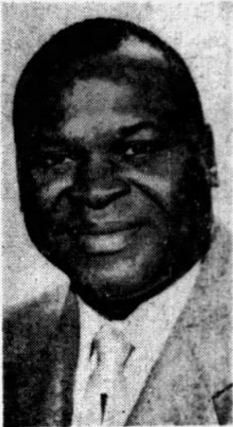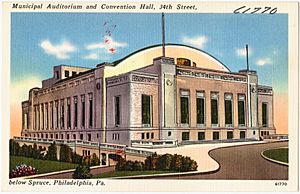Marshall L. Shepard facts for kids
Marshall Lorenzo Shepard, Sr. (born July 10, 1899 – died February 21, 1967) was an important American Christian leader and politician. He was a member of the Democratic Party. His work as a politician mainly happened in the city of Philadelphia.
Marshall Shepard was born into an African American family in North Carolina. He moved to Philadelphia to become the pastor of Mount Olivet Tabernacle Baptist Church. This was a black Baptist church. He served as pastor there for forty years. He became well-known across the country as a preacher. Shepard also got involved in politics in Philadelphia. He was elected to the Pennsylvania General Assembly three times. He also served three terms on the Philadelphia City Council. He worked there until he passed away in 1967.
Early Life and Education
Marshall Shepard was born on July 10, 1899, in Oxford, North Carolina. His parents were Robert and Pattie Gilliam Shepard. His father, Robert, was born into slavery. He later became a Baptist minister. He also led the Colored Orphanage Asylum of North Carolina. His mother, Pattie, also did charity work. She led the Women's Baptist Home Convention of North Carolina.
Marshall Shepard followed his parents and joined the First Baptist Church of Oxford. He went to Slater State Normal School in Winston-Salem, North Carolina. In 1921, he earned his Doctor of Divinity degree. He received this from Virginia Union University. This is a historically black university in Richmond, Virginia.
After college, Shepard moved to New York City. He continued his education at the City College of New York. He also studied at the Union Theological Seminary. From 1922 to 1923, he worked for the YMCA in Harlem. In 1923, he married Willia Lucille Owens. They had two sons together. That same year, he became an assistant pastor. This was at the Abyssinian Baptist Church in Harlem.
Leading a Church in Philadelphia
In 1926, Shepard became the pastor at Mount Olivet Tabernacle Baptist Church. This church was in West Philadelphia. He stayed there for the rest of his life. The church had money problems, especially during the Great Depression in 1929. Some church members even used their homes as collateral to help the church.
Shepard's fame as a minister grew. He worked as an assistant secretary for the National Baptist Convention. He was also an editor for the National Baptist Voice newspaper.
Shepard led the National Baptist Convention's Board of Foreign Missions for many years. In 1947, he went to a World Baptist Alliance meeting in Copenhagen. Even with his growing fame, he stayed dedicated to his Mount Olivet church. His Sunday morning sermons were very popular. Many people praised his preaching style. In 1960, he supported Senator John F. Kennedy for president. He spoke out against those who opposed Kennedy because of his Roman Catholic faith.
Shepard's Political Career
Shepard's church members encouraged him to get involved in politics. He held several important jobs during his life. He ran as a member of the Democratic Party. In 1934, he was elected to the Pennsylvania House of Representatives. He was one of three members from the 18th district. While in the legislature, he helped create a bill. This bill would have stopped racial discrimination in state contracts.
Shepard was asked to give a prayer at the 1936 Democratic National Convention. This event was held in Philadelphia that year. A Senator from South Carolina, Ellison D. Smith, walked out when he saw a black minister on the stage. Shepard's response was, "it was just a sign the good brother needs more prayer."
In 1936, Shepard was reelected to the legislature. The next year, he was chosen to help write a new city plan for Philadelphia. However, the voters did not approve this plan. He did not run for reelection in 1938. But in 1940, he ran again and was elected. After that term, President Franklin D. Roosevelt appointed Shepard as the recorder of deeds in Washington, D.C. He held this job until 1951. At that time, Shepard and Mary McLeod Bethune were the only two black people working in government in the nation's capital.
Shepard left his federal job to run in the 1951 election in Philadelphia. The Democrats chose him to run for the recorder of deeds job. This job was elected by voters in Philadelphia. He won the election. This was part of a big win for the Democratic Party. They took power from the Republican Party for the first time in 67 years. The recorder of deeds job was later changed in 1953. Shepard was then named Commissioner of Records.
In 1955, Shepard ran for a seat on the Philadelphia City Council. He won one of the Democratic spots and was easily elected. On the council, he led the public works committee. Shepard was reelected in 1959 and again in 1963.
In February 1967, he had surgery to remove a brain tumor. Three weeks later, he passed away at the University of Pennsylvania Hospital. He was 67 years old. After a funeral at his church, he was buried in Oxford, North Carolina. His son, Marshall Jr., later became the leader of the Mount Olivet Church. In 2008, the Philadelphia Housing Authority opened new homes near the church. They named this new development after Shepard.
 | John T. Biggers |
 | Thomas Blackshear |
 | Mark Bradford |
 | Beverly Buchanan |



